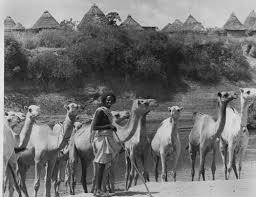By Prof Said S. Samatar
Editor’s note: As part of our ongoing remembrance of Said Sheikh Samatar Qali, one of the greatest scholars the Somali speaking people has produced. The passing of Dr. Samatar, a fine and unparalleled scholar, and a gifted linguist, was a great loss to the entire Somali speaking people. In this article, first published on WardheerNews, September 12, 2014, Prof Samatar is in his colorful, humorous and prolific language shares his biography.
———-
Can a case be made that adults are educable?
I’ve lived a life of segmented improbabilities
I was born and raised a camel herder in the over-heated sand dunes of Ethiopia’s eastern Ogaden (Somali region), between a place called Qari-Jaqood and another called Jiriiban (from “Jirriban,” or “Land of Torture,” in Mudugh Province, Somalia)–both patches designated by Allah as his chosen “Hell on Earth.” I joined the human race by being born, probably, under an acacia tree. I did not learn to read and write until well into my sixteenth year. And now I am a professor at an American university. To borrow an Americanism, “Go, figure.”

The early years of my portioned life as a herdsman knew much joy, but also much grief. In the thorny, desiccated camel country that my family frequented, the settled existence of sedentarized agriculture was unknown. We lived off of our herds of camels and flocks of sheep and goats–the land being too dry and harsh for cattle. We trekked from camp to camp in search of pasturelands for the herds. We tracked and trapped deer, too, for supplementary diet.
The family consisted of two nomadic hamlets: my mother’s hamlet and my elder mother’s, named Aaye Bullo—Aaye Bullo was practical, resourceful and without pretentions. My mother on the other, Faadumo Duco, or the Blessed Faadumo, having hailed from an Islan (chiefly) pedigree, was too blessed and nobility-pretentious to be concerned about the cares of her neglected children. She nagged the old man (my father) to death for marrying him, a lowly commoner, thereby dooming herself to poverty and misery. So, even nomads suffer a sense of the class itch. The old man, though, had a long memory; he retaliated with a sentence of divorce on her when she grew elderly and unable to bear any more.
Seven uterine siblings and seven half siblings, totaling a brood of fifteen survivors. A number of others died in infancy and early childhood. We were ruled by my father, Sheikh Samatar, a pious religious man (Islam), but also a draconian disciplinarian who, when crossed by friend or foe, gave no quarter. And he had an eventful, flamboyant history as a youngster: in the 1920s, he was press-ganged into the local Somali militia called “Bande” by their Italian colonial officers. By this time the southeastern portion of Somalia was under Italian colonial rule, whence he was taken to Libya (1922) to fight the legendary Omar Mukhtar, who was then waging an epic war of resistance against fascist Italy. When the youthful Samatar realized that he was brought to the Libyan wilds to fight fellow Muslims, he deserted the Italian army, walked across the blistering inferno of the Libyan desert with, perhaps, Arab traders who, surely, would have traded him off into slavery, had it not been for the timely intervention of a kind stranger–an itinerant holy man and his disciples who saved my father-to-be from a grim fate.
Read more: Herdsman Townsman – My Segmented Life
Prof Said S. Samatar


Leave a Reply